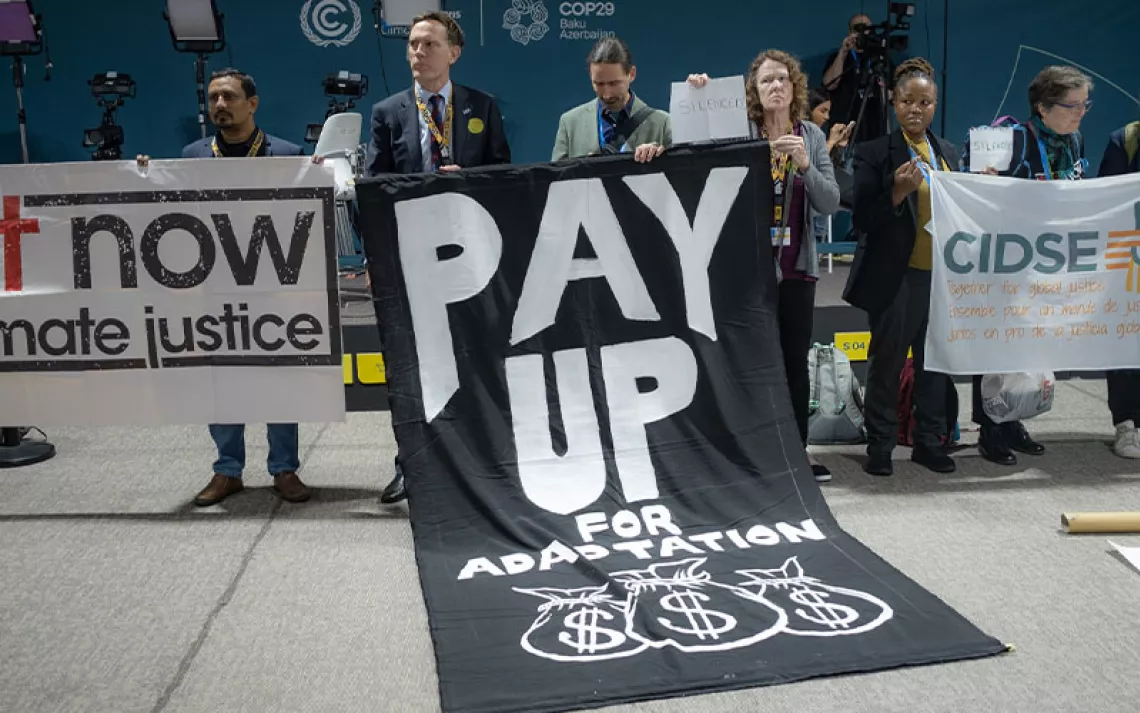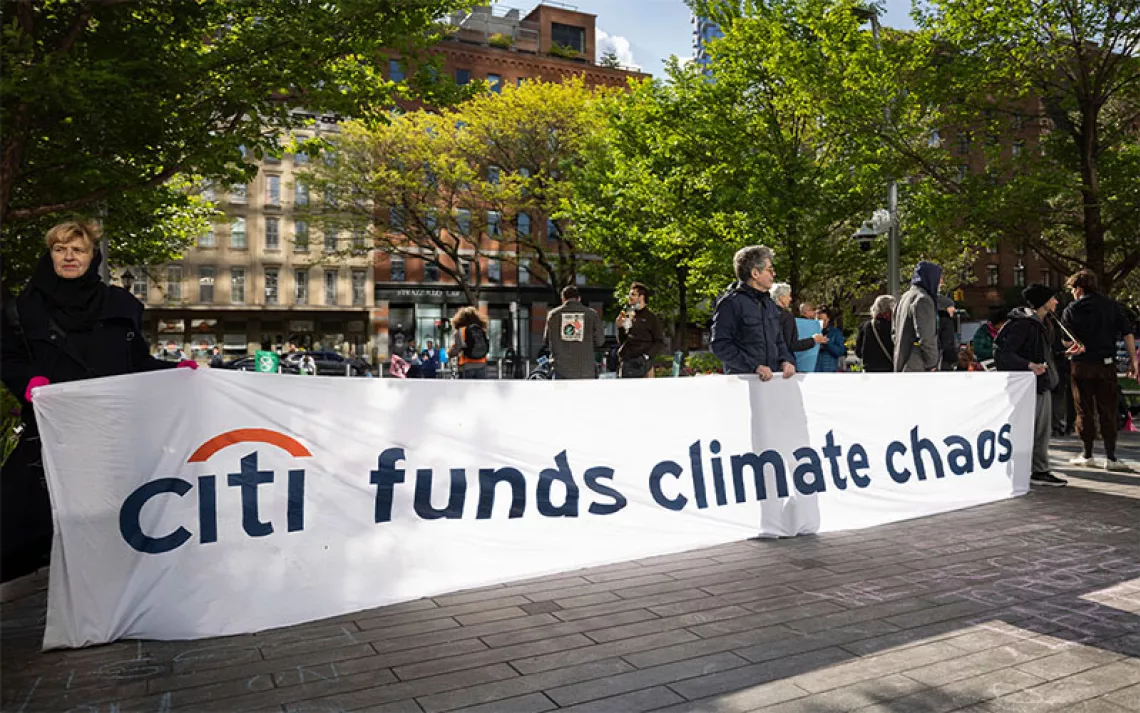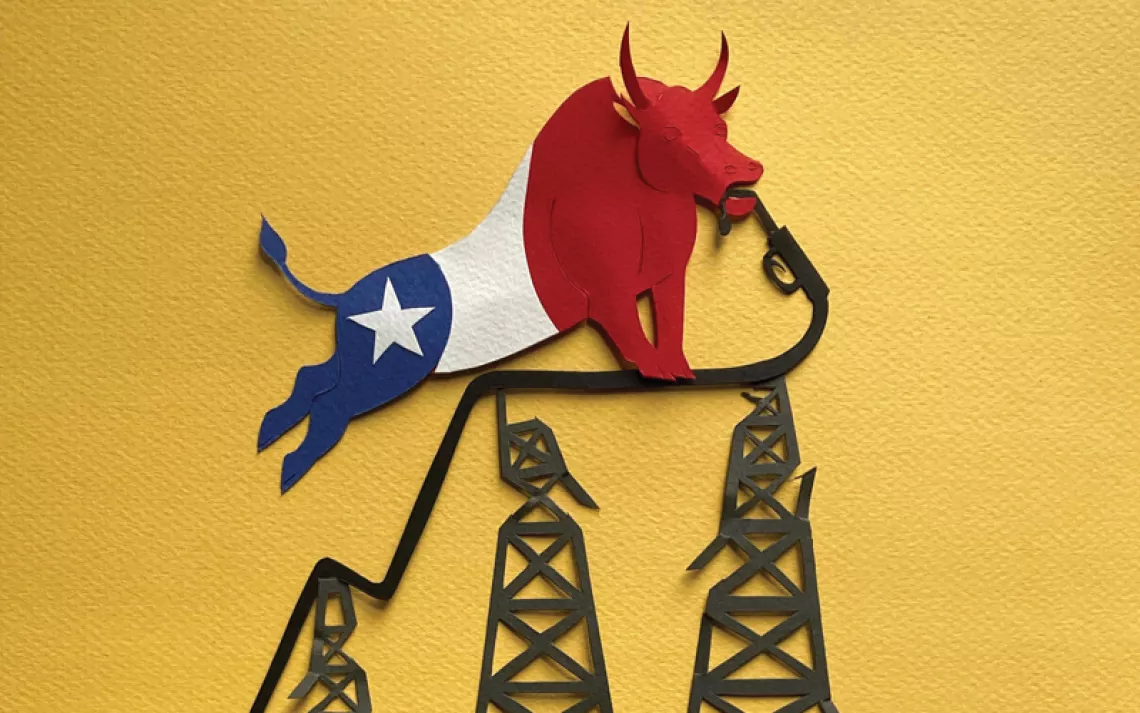Climate Protesters Take on Wall Street
Hundreds of activists raise the heat on fossil fuel funders this summer
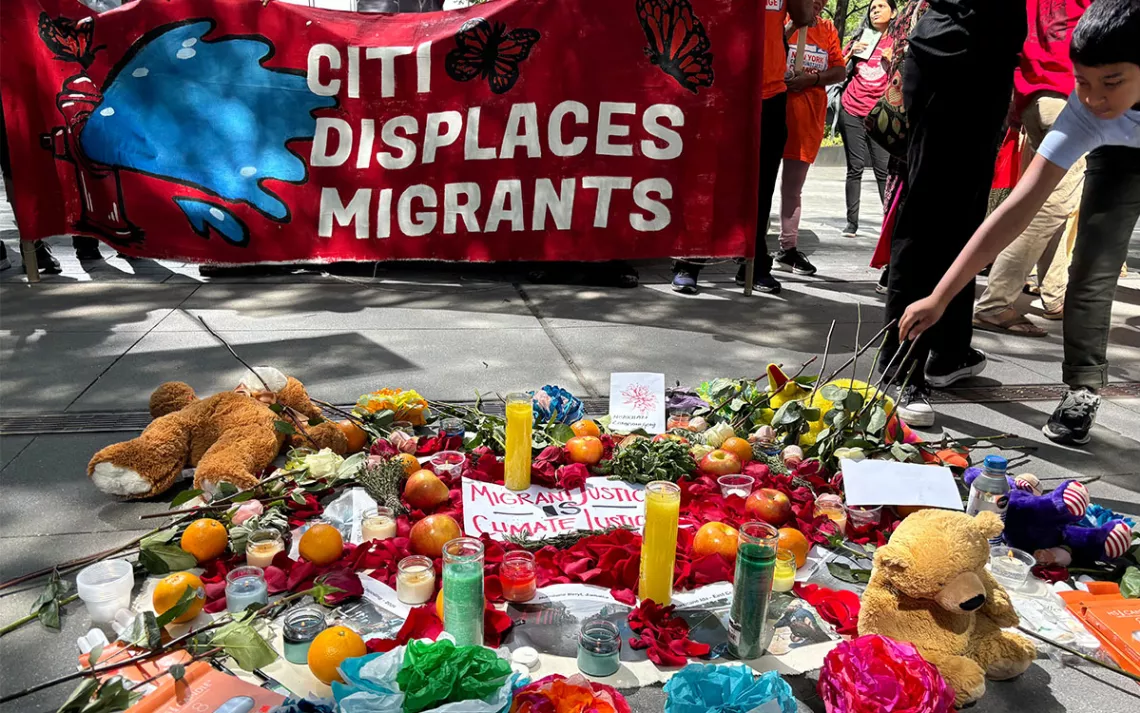
An altar for lives lost to climate change.
On a hot, sunny August morning, protesters gathered in front of Citigroup’s New York City headquarters to represent the Summer of Heat on Wall Street—a coalition formed by New York Communities for Change, Stop the Money Pipeline, Planet Over Profit, and Climate Defenders to call for an end to financing fossil fuels.
Since June, hundreds of activists have been protesting; depending on the week, their rallies may also address weapons manufacturing, oil and gas projects in the Gulf South, and operations in Israel. “Part of the reason we organize these different weeks is to show the breadth of the community here, and just how many different kinds of people [are angry] and want to see change urgently,” said Alice Hu, an organizer with New York Communities for Change, a labor and community organizing nonprofit.
The movement targets Citigroup for being a main funder of new fossil fuel projects worldwide despite its stated sustainability goals. Citigroup was the world's second-largest funder of fossil fuels from 2016 to 2023, after JPMorgan Chase, according to the Banking on Climate Chaos Report. Citigroup disputes these numbers. In a written statement to Sierra, a company spokesperson stated, “Citi has a long-standing record of fostering open dialogue and reaching constructive solutions with a range of stakeholders, and we are transparent about our climate-related activities. We are supporting the transition to a low-carbon economy through our net-zero commitments and our $1 trillion sustainable finance goal. Our approach reflects the need to transition while also continuing to meet global energy needs.”
For the protesters, the situation is too urgent for a slow transition. “The Summer of Heat campaign believes that the [climate] crisis has really hit a breaking point, that we’re out of time to see major moves away from fossil fuels,” said Hu. “And we believe that one of the sharpest strategies to use is sustained protests and disruption against the companies that are most involved in backing the fossil fuel industry and continuing to enable its operations.”
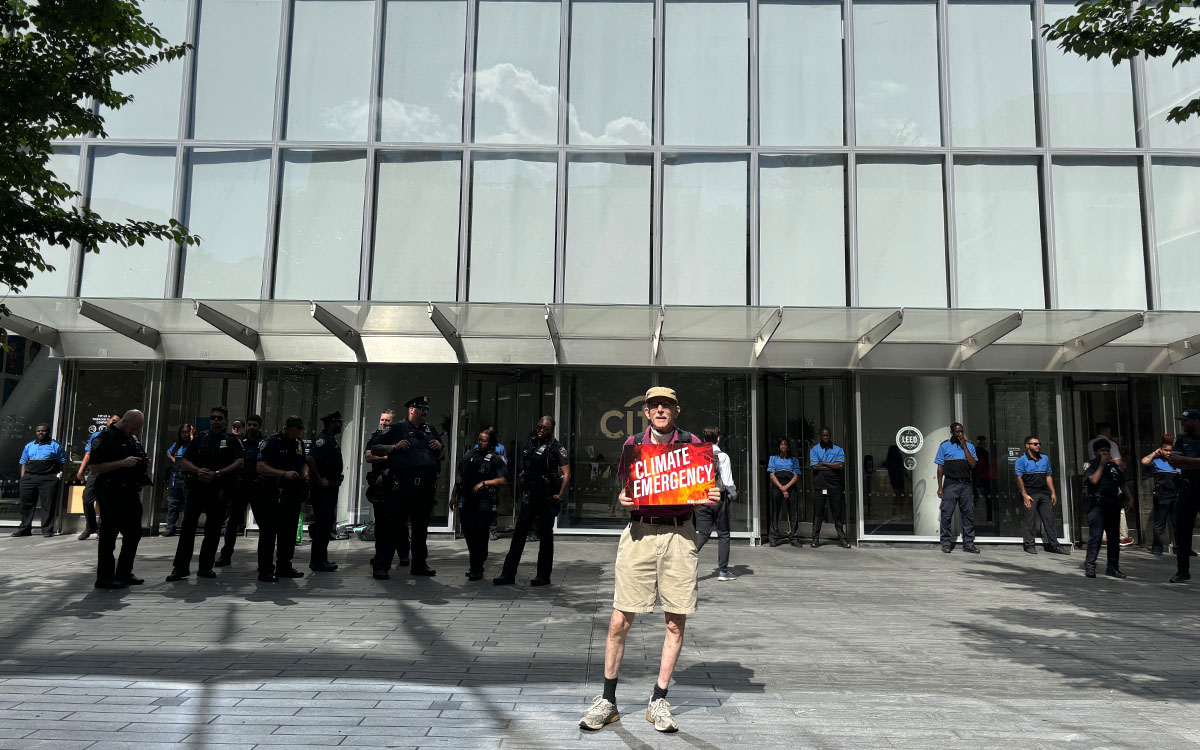
Zack Weinstein, climate activist, pickets in front of CitiHQ. “I’m here to send a message to Citibank that they need to start thinking about their future, our children’s future, and stop funding fossil fuels.”
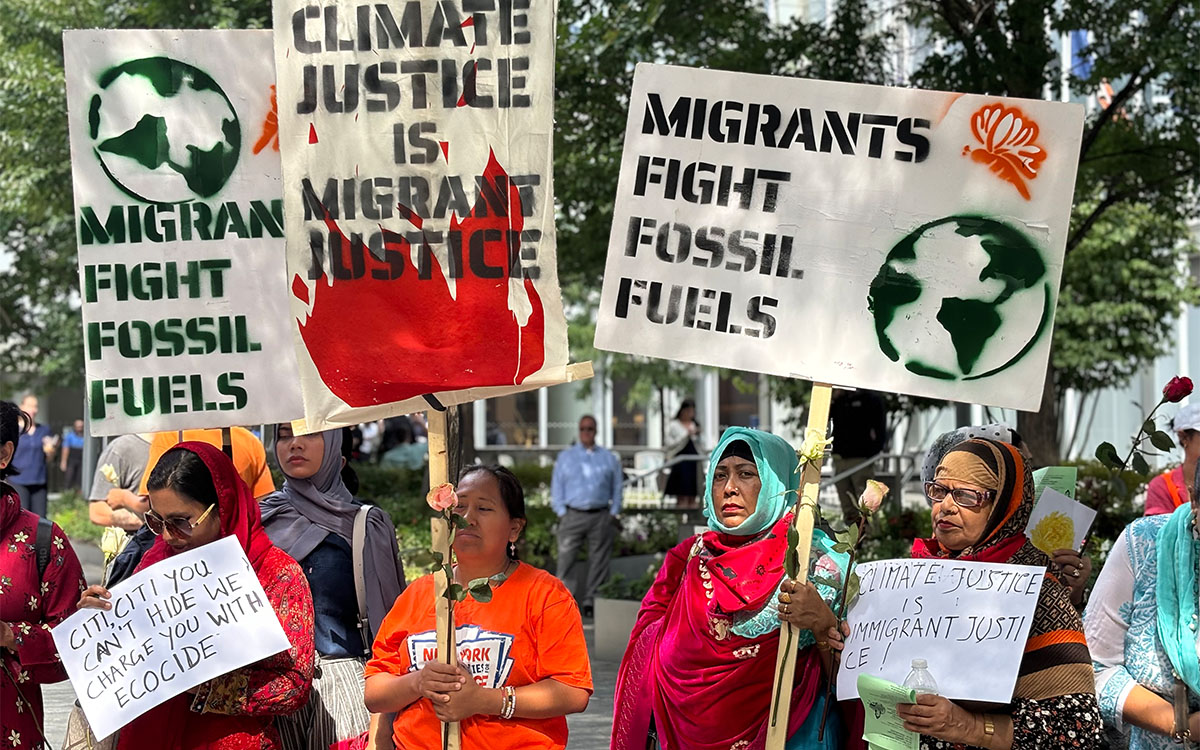
Protesters hold banners and pickets in front of the company’s headquarters.
Last week, the focus was on migrant justice. During Tuesday’s protest, speakers from places like Bangladesh, Jamaica, and Puerto Rico offered testimonies of how their lives have been impacted by climate change and the fossil fuel industry. “When I was 10 years old, I had one of the most traumatic experiences of my life,” said Fahmida Rahman, a Bangladeshi American climate activist with Desis Running Up and Moving. After days of heavy rain, her house “looked like a floating island surrounded by water,” and her family struggled to find food. Since then, major climate events have only gotten worse in Bangladesh. Millions of people were displaced and eight were killed after repeated floods in the country this summer. “We hold Citi responsible for the destruction of our lives,” she said. “We hold Citi accountable for family separation and the displacement of millions of people.”
Other protesters echo that sentiment. “Bangladesh is at the center of the climate disaster,” said Kazi Fouzia, an activist who has attended the protests all summer. “As a Bangladeshi and as a New Yorker, it is my responsibility to fight for climate justice.”
Alongside their moments of anger and joy, the protesters held space for grief. “We are here consciously remembering people who have lost their lives because of climate change,” said one speaker as people offered flowers to an altar for remembrance. Thirteen hundred people die in the United States every year from heat alone, and Hurricane Beryl—which was made more dangerous because of climate change—killed at least 36 people in Texas.
While the protesters sang, chanted, and mourned, they were surrounded by NYPD officers and Citi security guards. According to Hu, 485 people have been arrested during their civil disobedience actions. Citi employees have also allegedly threatened protesters with violence, and the company has urged its workers to not engage with activists. But the movement remains undeterred. “Citigroup and other big funders can expect even more ramped up disruption next year,” said Hu. “And we have hope that this is going to expedite the process of these companies removing their backing of fossil fuels.”
Hu believes the movement’s actions have started to move the needle forward. “We have internal reports that show that executive team leadership are highly concerned about the impact that these projects are having on employee morale and on the company’s operations.”
The group is planning future civil disobedience actions in the city. They’ll continue until Citi makes public commitments to stop funding fossil fuels. “We don't think that Citigroup or any of our other targets should expect a break from this,” Hu said.
 The Magazine of The Sierra Club
The Magazine of The Sierra Club
